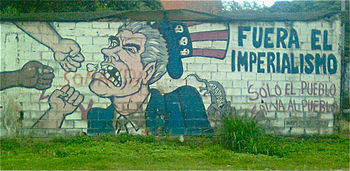
Back معاداة الاستعمارية Arabic Antimperialismu AST Antiimperializm Azerbaijani Антыімперыялізм Byelorussian Антиимпериализъм Bulgarian Антиимпериализм BXR Antiimperialisme Catalan Gwrth-imperialaeth Welsh Antiimperialismus German Αντι-ιμπεριαλισμός Greek


Anti-imperialism in political science and international relations is opposition to imperialism or neocolonialism. Anti-imperialist sentiment typically manifests as a political principle in independence struggles against intervention or influence from a global superpower, as well as in opposition to colonial rule. Anti-imperialism can also arise from a specific economic theory, such as in the Leninist interpretation of imperialism (Vladimir Lenin's theory of surplus value being exported to less developed nations in search of higher profits, eventually leading to imperialism), which is derived from Lenin's 1917 work Imperialism, the Highest Stage of Capitalism. People who categorize themselves as anti-imperialists often state that they are opposed to colonialism, colonial empires, hegemony, imperialism and the territorial expansion of a country beyond its established borders.[1]
An influential movement independent of the Western left that advocated religious imperialism was pan-Islamism; which challenged the Western civilisational model and rose to prominence across various parts of the Islamic world during the 19th and 20th centuries. Its most influential ideologue was the Sunni theologian Muhammad Rashid Rida, a fierce opponent of Western ideas, who called upon Muslims to rise up in armed resistance by waging jihad against imperialism and re-establish an Islamic caliphate.[2][3][4][5][6] Through his resolution in the Second World Congress of Comintern (1920), Lenin accused the anti-imperialism of pan-Islamists of favouring the interests of the bourgeoisie, feudal landlords and religious clerics; and incited communists to compulsorily fight pan-Islamism. Since then, Soviet authorities regularly employed the charge of pan-Islamism to target Islamic dissidents for anti-Soviet activities and fomenting anti-communist rebellions.[7][8]
The phrase gained a wide currency after the Second World War and at the onset of the Cold War as political movements in colonies of European powers promoted national sovereignty. Some anti-imperialist groups who opposed the United States supported the power of the Soviet Union, while in some Marxist schools, such as Maoism, this was criticized as social imperialism. Islamist movements traditionally view Russia and China as imperial and neo-colonial forces engaged in persecution and oppression of Muslim communities domestically and abroad, in addition to the U.S. and its allies like Israel.[9]
- ^ Richard Koebner and Helmut Schmidt, Imperialism: The Story and Significance of a Political Word, 1840–1960 (2010).
- ^ Salvatore, Armando; Hanafi, Sari; Obuse, Kieko, eds. (2022). The Oxford Handbook of the Sociology of the Middle East. New York: Oxford University Press. pp. 13, 860, 861. doi:10.1093/oxfordhb/9780190087470.001.0001. ISBN 9780190087470. Archived from the original on 2023-01-04. Retrieved 2023-01-04.
- ^ M. Landau, Jacob (2016). Pan-Islam: History and Politics. New York: Routledge. p. 9. ISBN 978-1-138-83939-7. Archived from the original on 2023-02-05. Retrieved 2023-01-04.
- ^ Roy, Olivier (2007). "3: Reform Movements among the Muslims of the Empire". The New Central Asia: The Creation of Nations. New York: New York University Press. p. 39. ISBN 978-0-8147-7609-4. Archived from the original on 2023-02-05. Retrieved 2023-01-04.
- ^ Mahmoud Abdelnasser, Walid (2011). "1: A Historical Background". The Islamic Movement in Egypt: Perceptions of International Relations 1967–81. New York: Routledge. pp. 31, 32. ISBN 978-0-7103-0469-8.
- ^ Kapila, Shruti (2021). "2: Ghadar! Violence and the Political Potential of the Planet". Violent Fraternity: Indian Political Thought in the Global Age. Princeton, New Jersey, USA: Princeton University Press. p. 58. ISBN 978-0-691-19522-3.
- ^ Calvin Ricklefs, Merle (2007). "8: Polarities Politicised, c. 1908-30". Polarising Javanese Society: Islamic and Other Visions, c. 1830–1930. Singapore: NUS Press. pp. 235, 236. ISBN 978-9971-69-359-6.
- ^ M. Landau ·, Jacob (2015). "III: Pan-Islam clashes with the Russian and Soviet authorities". Pan-Islam: History and Politics. New York: Routledge. pp. 167, 168. ISBN 978-1-138-83939-7.
- ^ E. Fuller, Graham (2003). The Future of Political Islam. New York: Palgrave Macmillan. p. 40. doi:10.1057/9781403978608. ISBN 978-1-4039-6556-1. Archived from the original on 2023-01-04. Retrieved 2023-01-04.